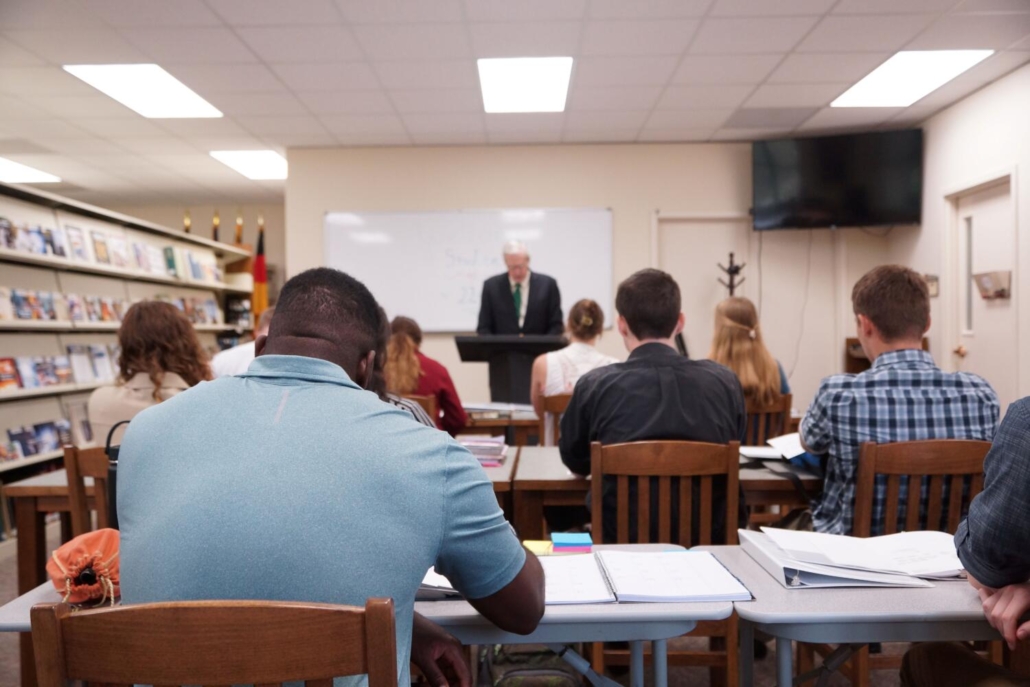Easter or Passover? by Dexter Wakefield
Recently, we observed the Passover, and millions of other people observed Easter. Does it matter which festivals you observe? The answer may surprise you!
Course Spotlight from God’s Feast Days: Passover
Recently, we observed the Passover, and millions of other people observed Easter. Does it matter which festivals you observe? The answer may surprise you!
Course Spotlight from God’s Feast Days: Passover
Author: Nathan Kroon | Student Leader, Living Education – Charlotte, 2022-23
Estimated Reading Time: 5 min.
Our media today sees people as very liberal if they care for the environment, but tending it is important, and doing so helps connect us to God. Micah 4:4 paints a beautiful picture of the Millenium, in which everyone will sit under their own vine and fig tree. This certainly doesn’t mean that everyone will have to be a farmer during this time, but there will be a deep connection to the land.
Today, most people are growing further apart from creation as humanity is being swept up in technology. Modern advances and tools are tremendously convenient, but as we go along, we must not lose our connection with the ground we were made from (Genesis 3:19). As we lay a foundation for our lives, and as we think about how we’ll go forward, we should consider growing things around us!
Not everyone has an affinity for the outdoors, but they can still connect to the natural world from indoors. Flowers can make for colorful additions to your home, both indoors and outdoors. They are also a reminder of all the color and detail that God put into creation. Men might think of them as “girly” plants, but even if they don’t enjoy flowers, they can grow them for the women in their lives (mothers, sisters, wives, etc.)! Vegetable plants and fruit trees can also be very useful. Most people like good food, and growing fruits and veggies can help you to eat better. Finally, plants and shrubs can make your home or balcony seem nicer and look more complete.
Mr. McNair brought several plants that he and his wife had grown, and showed them to the students. He said that it was truly incredible that something as small as a seed can carry the genetic code necessary to grow into a much larger plant. It’s nothing short of a miracle, and it reminds us of a tremendous power in the world that God put in place.
Mr. McNair listed many health benefits that growing plants outdoors can offer:
People are often fascinated with online farming games, but it’s much healthier to invest a little time into the real deal!
Growing fruits and vegetables will help you to save good money on groceries. Mr. McNair recommended buying heirloom plants, which allow you to replant seeds found within the vegetable or fruit. A tomato from a store can cost 233 times more than it would to grow one from a seed packet.
If you’ve never planted anything, you can be practical in doing so! Mr. McNair listed some ways:
The earth’s seasons reflect God’s plan, and the Holy Days are anchored in them. God created both the seasons and the Holy Days because He has a wonderful plan for us. Currently, the time of the year is the season of firstfruits, and the blossoming of flowers and trees reminds us that God is calling people into the truth.
Mr. McNair stated that in our current age, most people of our nation are able to live better than most of the kings of the Bible. He then read from Ecclesiastes 5:9: “Moreover the profit of the land is for all; even the king is served from the field.” Even though we may live relatively like kings, there is still much profit to be found in growing things. We find a lot of unreality in our world. The natural world can help us to see reality again, so grow something—anything!

Nathan Kroon is a Student Leader at Living Education. He originally hails from Washington State and is a 4th generation Christian. Currently, he works at Headquarters as a Video Editor and is the Lead Landscaper at the LivingEd dorms. His hobbies include playing guitar, listening to music, drawing, and watching movies.
Author: Kaleb Johnson | Student, Living Education – Charlotte, 2022-23
Estimated reading time: 4 min.
Mr. Ames gave a forum presentation on discipline. He began by playing a six-minute video clip from Admiral McRaven’s famous commencement speech. This clip emphasized the importance of having the discipline to do the little things, the “insignificant” things, day after day. This kind of consistency is critical. After all, “if you want to change the world, start off by making your bed” (Admiral McRaven). Mr. Ames clarified that true Christians should take this seriously because we have the chance to help change the world one day, but we are going to need discipline to get there.
Mr. Ames joined the army reserves as a young man, and even in basic training, they made the recruits make their bed every single morning. That lesson stuck, and Mr. Ames has been making his bed every morning for 64 years. Discipline in this area led to discipline in morning prayer, a necessity for growth as a Christian. In fact, discipline is not just for the military, but as Mr. Ames said, “it is an essential aspect of godly character!”
Mr. Ames explained that there are many facets of discipline. There is athletic discipline, displayed by all athletes who excel in their field. We ought to apply this in our life by making exercise a habit and sticking to it. There is discipline in the fine arts. Is it easy to practice an instrument daily for years and years or to slowly master oil painting? Of course not! It takes discipline.
Mr. Ames also explained that we need business discipline. We can learn to avoid crises and prevent them through planning, strategizing, and executing consistently. Also, there is academic discipline. In fact, the term discipline is closely connected to academia. For instance, the phrase “academic discipline” refers to a subset of knowledge that is taught and researched at Universities. But, we must also exercise discipline in our education by being diligent and working ahead. Mr. Ames related a technique that can help overcome procrastination. He would tell himself, “I am going to work on this project for 5 minutes; that’s it.” This would break the ice, and make it easier to work on projects a little bit every day.
We are also familiar with child-rearing discipline, which is teaching children to obey rules and codes of behavior through punishment for breaking them. But there is also another form of discipline. In fact, it is the most important form.
Why is discipline necessary as a Christian? Mr. Ames explained with a quote by the author H. Jackson Brown (Jr.): “Talent without discipline is like an octopus on roller skates. There’s plenty of movement, but you never know if it’s going to be forward, backwards, or sideways.” If we want to be moving forward and not backwards or sideways, we must have spiritual discipline.
The Bible is not shy on this topic. Mr. Ames pointed out that God exercises child-rearing discipline on us (Hebrews 12:3-11), and we learn to control our actions and have discipline through God’s chastening. This is necessary because humans do not naturally direct their paths (Jeremiah 10:23) and must develop this control, this discipline.
Mr. Ames explained that Paul explicitly affirms discipline. “I discipline my body and bring it into subjection, lest, when I have preached to others, I myself should become disqualified” (1 Corinthians 9:27). Mr. Ames further explained that the term “disciple” is closely connected to discipline. A disciple follows the teachings of a master. Discipline is the act of following rules or guidelines. Thus a disciple exercises discipline in following his master!
Mr. Ames then pointed out that God’s spirit itself promotes discipline. “For the Spirit God gave us does not make us timid, but gives us power, love and self-discipline” (1 Timothy 1:7, NIV). This is explained in-depth in a sermon by Mr. Ames, The Gift of Discipline.
Mr. Ames gave the conclusion of his forum: Make your bed every morning. Discipline is clearly important, and this is a way to practice it and build it in our lives. It is a small task, but if we do it, we start the day with a task completed. Mr. Ames explained that God expects us to practice discipline and to recapture true values. He expects us to display godly love, godly service, and godly discipline.
Mr. Ames gave a forum recently about the true values of abundant living (spoiler alert: this forum also talks about the importance of discipline).

Kaleb Johnson is a student in the Living Education-Charlotte Program. He graduated with a degree in Chemical Engineering from the University of Alabama in Huntsville in the spring of 2022. In addition, Kaleb enjoys writing, video-making, trying new activities (anything and everything), playing chess, and debating (it’s not arguing!) with people. He currently works in the Living Education department producing written content & videos and helping with a variety of other projects.
The Living Education – Charlotte program for 2023-2024 is already nearing maximum capacity, but next year is nearer than you may think. We encourage young adults, parents, grandparents, and everyone else to explore the exciting Living Education onsite program. See how the 2023-2024 students will be kept busy in this nine-month, immersive program!
Note: all links do work but some require you to scroll down to see the relevant information
Additionally, you can find forum summaries and student life articles on our blog.
“And the things that you have heard from me among many witnesses, commit these to faithful men who will be able to teach others also.”
2 Timothy 2:2 NKJV

This excerpt outlines important lessons we can learn from the very first Passover!
Course Spotlight from God’s Feast Days: Passover
